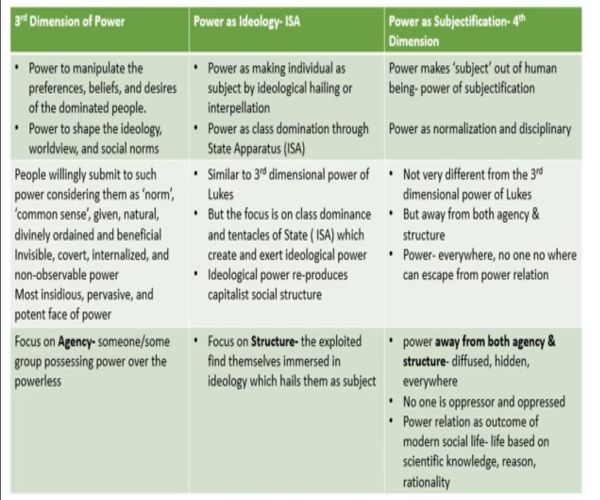2024-07-20
Power
Power is influence, it influences actions of political actors and people.
Harold Lasswell: Politics as "study of influence and influential"
David Easton: Politics as authoritative allocation of values
Thinkers
Steven Lucke
1941, British political and social theorist, liberal thinker.
Books:
- Power: A Radical View, 1974
- Individualism, 1973
- Marxism and Morality, 1985
- Moral Relativism, 2008
3 Faces of Power: Decisional, non-decisional, and ideological-social-cultural and psychological
Louis Althusser
1918-1990, French Marxist philosopher- structural Marxism
Books:
- Ideology and Ideological State Apparatuses, 1970
- For Marx, 1965
- Lenin and Philosophy
Power as making individual as subject by ideological hailing or interpellation
Power as class domination
Michel Foucault
1926-1984, French post-modernist thinker- post-structuralism
Books:
- Essay: "The subject and Power", 1982
- Discipline and Punish, 1975
- Madness and Civilization, 1961
- The Order of Things, 1966
- The History of Sexuality, 1976
- The Archaeology of Knowledge, 1969
Power as making normalized, governable subject- subjectification, individualization
Power as control of knowledge- discursive power
Power beyond Agency and structure- everywhere
Dimension of Power
1st Dimension - Decisional Power
Robert Dhal (on democracy, and who governs)
He gave this concept, while analyzing group politics in the city of New Heaven, USA, 1960s. Powers as the ability to influence decision and outcomes in a given domain.
Whose interest/choice prevails in decisions
Power as agency based, observable, visible, overt, definitive, instrumental
Pluralist view of Power
2nd Dimension - Agenda Setting
Petter Bachrach and Morton S. Baratz, in "Two Faces of Power", 1962
Non decisional power, Agenda setting power
Who decides what is to be decided? 'B' hesitates from voicing and raising issue of interest to him/her, anticipating an unpleasant reaction from 'A'
Power as processes of exclusion through structural constraint
Power as defining the range of possibilities in a system
Non observable power
3rd Dimension - Ideological, sociological
Steven Luke, "Power: A Radical View", 1974
Sociological, cultural, ideological dimension of power
Power to manipulate the preferences, beliefs, and desires of the dominated people.
Power to shape the ideology, worldview, and social norms
People willingly submit to such power considering them as 'norm', common sense', given, natural, divinely, ordained and beneficial
Invisible, convert, internalized, and non-observable power
Most insidious, pervasive, and potent face of power
Practical consciousness -> Giddens
Habitus -> Bourdieu (he also gave 'cultural capitalism')
Louis Althusser - Class, Ideology and Power
For continued dominance, capitalist class need to continuously reproduce the capitalist social structure
It is primarily done through Ideological state apparatuses, and to some extent by Repressive state apparatuses
By ideological hailing or interpellation, individuals are made subjects, subjects willingly accept capitalist social structure as 'given', natural, normal, and commonsensical
Subject
Two meaning
- A free subjectivity, a center of initiatives, author of and responsible for its action; Subject as Agency
- A subjected being, who submits to a higher authority, and is therefore stripped of all freedom expect that of freely accepting his submission. Subject embedded in structure, stripped of his agency
Interpellation: Transform free subject into a subjected being - willingly- 'all by himself' - "There are no subjects expect by and for their subjection."
Ideology
Thesis 1:
"Ideology represents the imaginary relationship of individuals to their real conditions of existence."
Two step shifted reality - reality - imaginary relationship to reality - ideology
Thesis 2:
"Ideology has a material existence"
Ideology always manifests itself through actions, which are "inserted into practices"
Thesis 3:
"All ideology hails or interpellates concrete individuals as concrete subjects"
Thesis 4:
"Individuals are always-already subjects"
People are born as subject, becoming subject happens even before we are born
Ideological State Apparatuses
Components:
- The religious ISA
- The educational ISA
- The family ISA
- The legal ISA
- The political ISA (political system, including the different parties)
- The trade union ISA
- The communication ISA (press, social networks etc...)
- The cultural ISA (literature, the arts, sports, etc...)
Most potent ISA -> School-family couple, which has replaced the Church-family couple of medieval era.
ISA are considered in private domain, but in effect mandated by the state, act as its ideological apparatus.
ISA - at stake and site of class struggle
Michel Foucault: Power and the Subject
Power as subjectification
Two meanings of the word "subject":
- Subject to someone else by control and dependence
- Tied to his own identity by a conscience or self-knowledge
Both meanings suggest a form of power which subjugates and makes subject to.
Power denotes process of subjectification, making subject out of human beings
Subjectification is carried out in school, hospital, prison, offices, church/temple, corporates, media, family, and all organs of society
Subjectification is done by observation, scientific study of the 'man' by enforcing discipline, by normalization, and subjecting the individuals to socially created knowledge and 'regime of truth'
In this sense, the term "power" is not a determinate thing, it denotes relations between individuals - a Relation which can direct or determine another's behavior
Man finds himself everywhere in power relation, which acts on his actions, structuring the field of possible actions- thus power is a mode of action upon actions
Essential Aspects of Power relations
The system of Differentiation:
Subjects is divided inside himself or divided from others, exclusion and inclusion, being normal acceptable and deviant
The types of objectives pursued by those who act upon the actions of others:
The maintenance of privileges, the accumulation of profits, the brining into operation of statutory authority, the exercise of a function or of a trade
The means of bringing power relations into being:
Threat to arms, ideology, discourse, economic disparities, surveillance, Advertisement, etc.
Forms of institutionalization:
State and its formal institutions, social sciences, psychiatry, family, schools, and medicine, corporates, media, film, etc.
The degrees of rationalization:
Science of power, technological refinements employed in the exercise of power; exercise of power is elaborated, transformed, organized- it has a rational structure
It pre-supposes freedom, free will of one whose conduct is governed and resistance to such governance
Features
Power is everywhere, it is diffused, it both away from agency and structure, not episodic (at a particular movement), neither exerted by one over other all the time - everyday, socialization and embodied phenomenon in all walks of life
It is like governing (governing behavior of others, not governments governance) other, making them governable (by normalizing, disciplining)
All, both dominant and dominated, face power relation and are subjectified
Power and knowledge linked: Power produce knowledge, which in turn produces power...truth is nothing but a social construct - regime of truth (commonly accepted norms, beliefs values, practices) produced by these in power
Bio-power: power to discipline and normalize human body, its sexuality, set of mechanisms through which the human body became an object of political strategy
His power "is diffuse rather than concentrated, embodied and enacted rather than possessed, discursive rather than purely coercive, and constitutes agents rather than being deployed by them"
"It incites, it induces, it seduces, it makes easier or more difficult; in the extreme it constrains or forbids absolutely; it is nevertheless always a way of acting upon an acting subject or acting subjects by virtue of their acting or being capable of action. A set of actions upon other actions"
The Panopticon

An architectural design of Prision, where guard can watch everyone, but prisoners can't see the guard.
Propound by Jeremy Bentham
Focault takes Panopticon as a metaphor, that allowed him to explore the relationship between systems of social control and people in a disciplinary situation, and the power-knowledge relationship.
In his view, power and knowledge comes from observing others. It marked the transition to a disciplinary power, with every movement supervised and all events recorded. The result of this surveillance is acceptance of regulations and docility - a normalization of sorts, stemming from the threat of discipline.
Those under observation become conscious of their own visibility and as a consequence, start to observe themselves through the eye of the observing other; Thus, they subject themselves to the normalizing judgements of the observer.
The more one observes, the more powerful one becomes. The power cones from the knowledge the observer have accumulated from his observations - know to control.
"By being combined and generalized, they attained a level at which the formation of knowledge and the increase in power regularly reinforce one another in a circular process"
Juridical and Normalizing Power
Juridical Power:
Liberal view of power
Power of the sovereign to punish law breakers, criminals
Carried out through institutions of law, Parliament, Courts, police, Army, etc.
Formal legal power; political power
This power is negative, prohibitive, unproductive - "it's only method of power lies in its prohibition, its "rejection, exclusion, refusal, blockage, concealment, or mask"
Disciplining or Normalizing Power:
"This form of power applies itself to immediate everyday life which categorizes the individual, marks him by his own individuality, attaches him to his own identity, imposes a law of truth on him which he must recognize, and which others have to recognize in him. It is a form of power which makes individuals subjects"
Power relations in family, school, hospitals-medicine, psychiatry, offices, corporate world, advertisement, social media, etc. may be enabling and productive, too
"It produces reality; it produces domains of objects and rituals of truth. The individual and the knowledge that may be gained of him belong to this production"
"Disciplined self-subjectification constitutes a precondition for the empirical realization of normative principles of procedural justice and fair concerted power."
Criticism of Foucault's conception of power
Took power away from both agency and structure, making it so diffused, amorphous that its study becomes difficult and somewhat meaningless - Steven Lukes
Power as constituting the very 'self' of the man - going too far - Steven Lukes
His theory of power as powerful Nihilism (philosophy that rejected accepted or fundamental aspects of human existence, such as knowledge, morality, meaning. Discussed by the Buddha 563 BC to 483 BC) - Habermas
Radical Historicism- social constructivism. Even nature needs to socially construct.
Chronic Skepticism: Question all claims to authority and obligation. Negate all knowledge as discursive.
